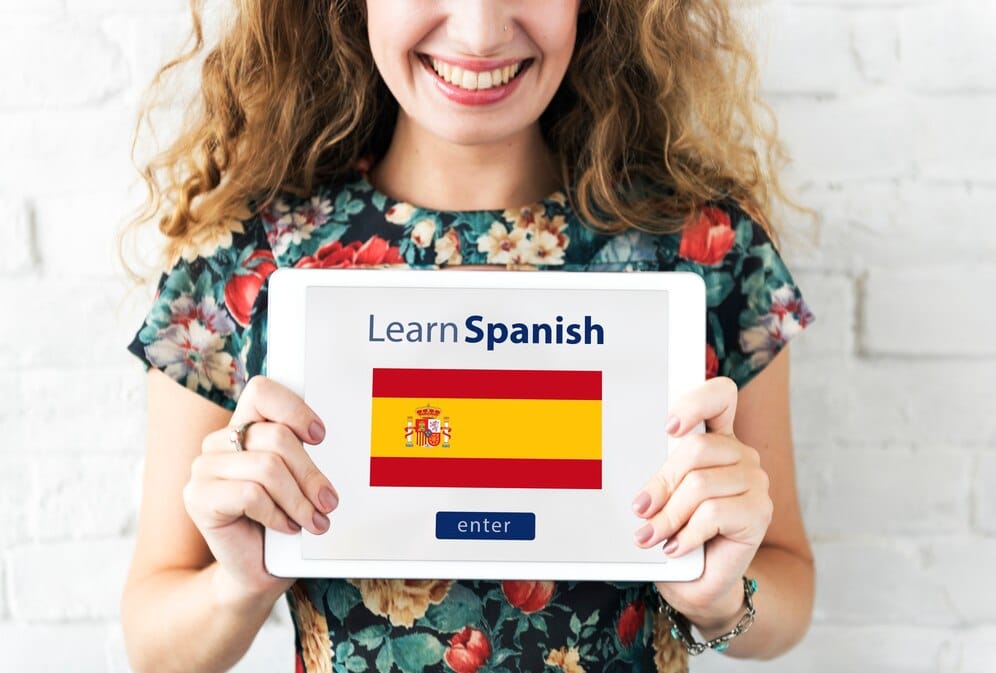how to learn spanish language
Introduction: Why Learn Spanish?
Spanish is one of the most widespread languages on earth, with more than 580 million native speakers across over 20 nations. Whether learning Spanish for business, travel, or cultural immersion, learning Spanish unlocks a world of possibilities.
Learning Spanish from the ground up can seem like a daunting task, but the right method, materials, and dedication can help you start speaking Spanish with confidence. This guide will take you through the steps that will make the Spanish learning process easy and fun.
Also read how-to-speak-english-fluently/

Step 1: Learn the Spanish Alphabet and Pronunciation
The Spanish alphabet contains 27 letters, including the unique letter “ñ.” Pronunciation is the link of communication:
Vowels:
A (ah), E (eh), I (ee), O (oh), U (oo)
Consonants:
Some of them make other noises than English, e.g., “J” (sounds like the English “H,” as in jalapeño).
Quick Tip:
Listen to Spanish native speakers and practice reading words aloud to improve pronunciation.
Step 2: Master Spanish Basic Grammar
Grammar is the backbone of all languages. Begin with these core concepts:
Articles and Nouns
Spanish nouns are gendered:
El libro (the book) – Masculine
La mesa (the table) – Feminine
Verb Conjugations
Regular verbs have consistent patterns. For instance:
Yo hablo (I speak)
Tú comes (You eat)
Él/ella vive (He/she lives)
Quick Tip:
Master frequent verbs, including ser (to be), tener (to have), and hacer (to do/make), as a priority.
Step 3: Construct Your Spanish Vocabulary
Begin with popular words and phrases:
Greetings: Hola (Hello), Buenos días (Good morning)
Common expressions: Gracias (Thank you), Por favor (Please)
Easy questions: ¿Cómo estás? (How are you?)
Rapid Tip:
Reinforce vocabulary using flashcards or apps such as Anki.
Step 4: Construct Simple Sentences
When you know simple words, start constructing sentences:
Quiero aprender español. (I want to learn Spanish.)
¿Dónde está el baño? (Where is the bathroom?)
Quick Tip:
Write down brief sentences and read them out daily.
Step 5: Utilize the Best Spanish Learning Tools
Language Learning Apps
Duolingo: Interactive, game-like practice sessions
Babbel: Emphasizes conversations and grammar
Memrise: Great for building vocabulary
Online Courses
Coursera: University-level courses (University of Barcelona, etc.)
italki: Native speaker private lessons
Books for Beginners
Easy Spanish Step-by-Step by Barbara Bregstein
Practice Makes Perfect: Spanish Verb Tenses
Media Resources
Podcasts: Coffee Break Spanish, Duolingo Spanish Podcast
YouTube Channels: SpanishPod101, Learn Spanish with Pablo
Movies & TV Shows: Binge-watch Spanish-dubbed versions of popular TV shows
Step 6: Practice Makes Perfect
It’s all about consistency when learning Spanish. Here’s how to dive into the language:
Practice with Native Speakers
Utilize language exchange websites such as Tandem or HelloTalk
Join Spanish-speaking local communities or online groups
Establish Realistic Goals
Acquire 5 new words every day
Practice speaking for 15 minutes a day
Watch Spanish Movies
Listen to Spanish music and try to interpret the lyrics.
Watch Spanish TV shows with subtitles
Practice Reading and Writing
Prepare short paragraphs or keep a daily journal in Spanish
Read Spanish news stories or beginning-level books
Quick Tip:
Use repetition techniques like spaced repetition to learn vocabulary better.
Step 7: Avoid Common Mistakes
Most beginners do the following simple mistakes:
Avoiding Noun Genders
Incorrect: El mesa ✅ Correct: La mesa
Mispronouncing Words
Vaca (cow) and Baca (roof rack) are similar-sounding words but with different meanings
Excessive Relying on Word-for-Word Translations
Correct: Estoy frío (I am cold)
Correct: Me siento frío (I feel cold)
Excluding Listening and Speaking Practice
Reading and writing are significant, yet fluency also involves active listening and speaking.
Quick Tip:
Practice the “shadowing technique” by shadowing native speakers and repeating speech in real time.

Quiz: How Well Do You Know How to Learn Spanish?
Take this fun quiz to test your knowledge about learning Spanish and pick up some tips along the way!
1. What is the best way to start learning Spanish?
a) Memorizing grammar rules
b) Watching Spanish movies without subtitles
c) Learning basic phrases and common vocabulary
d) Reading Spanish novels
Correct Answer: c) Learning basic phrases and common vocabulary
2. Which of the following is a common Spanish greeting?
a) Hola
b) Bonjour
c) Ciao
d) Hallo
Correct Answer: a) Hola
3. What is the Spanish word for “Thank you”?
a) Gracias
b) Merci
c) Danke
d) Grazie
Correct Answer: a) Gracias
4. How can listening to Spanish music help you learn the language?
a) It teaches advanced grammar
b) It improves pronunciation and listening skills
c) It helps you memorize conjugations
d) It has no impact on learning Spanish
Correct Answer: b) It improves pronunciation and listening skills
5. Which app is commonly used for learning Spanish?
a) Duolingo
b) Photoshop
c) Canva
d) Spotify
Correct Answer: a) Duolingo
6. What is the best way to practice speaking Spanish?
a) Reading a dictionary
b) Talking to native speakers or joining language exchange groups
c) Writing essays in Spanish
d) Avoiding speaking until you are fluent
Correct Answer: b) Talking to native speakers or joining language exchange groups
7. True or False: Learning Spanish vocabulary is easier when using flashcards.
Correct Answer: True
8. What is a popular Spanish phrase for “How are you?”
a) Cómo estás?
b) Qué pasa?
c) Por favor
d) Mucho gusto
Correct Answer: a) Cómo estás?
9. Which of these countries is NOT Spanish-speaking?
a) Spain
b) Mexico
c) Brazil
d) Colombia
Correct Answer: c) Brazil
10. What is the most important quality to have when learning Spanish?
a) Patience and consistency
b) Memorizing everything at once
c) Avoiding mistakes
d) Learning only through textbooks
Correct Answer: a) Patience and consistency
Your Results:
- 8–10 Correct Answers: ¡Excelente! You’re on the right track to mastering Spanish!
- 5–7 Correct Answers: ¡Muy bien! A little more practice, and you’ll be speaking Spanish fluently in no time.
- 0–4 Correct Answers: Don’t worry, you’re just starting. Keep learning and practicing!
Share this blog post
